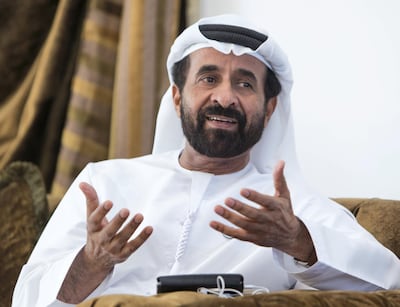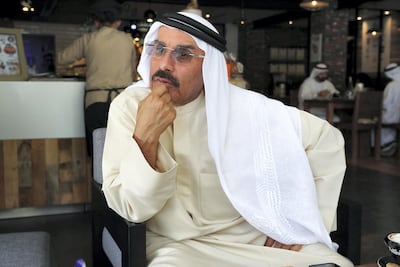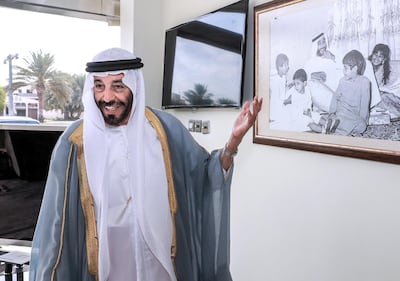The men who personally knew Zayed Al Khair (the good) each had their own relationship with him. On the anniversary of his death, The National interviewed three Emiratis who each saw Sheikh Zayed, if not on a daily basis, then at least once a week.
Sheikh Mussallam was a neighbour and knew Sheikh Zayed as the wise counsellor. To Mohammed Al Fahim, Sheikh Zayed was everything, especially a father. And for Saqr Al Muhairbi, Sheikh Zayed was the man who brought the country success and riches.
All were devoted to and felt immense love for the late President, who, they all agree, was a man that the world will struggle to see the likes of again.

Sheikh Mussallam
Sheikh Mussallam is a peacemaker, a man who can bring disputes to an end without raising his voice, never mind a fist or a weapon.
It is an invaluable skill that ended a family feud that brought bloodshed and tragedy, and one he learnt from the UAE’s Founding Father, Sheikh Zayed.
After resolving a fierce rivalry between two tribes at his majlis in Al Ain, he reflects on how he has put the wisdom of Sheikh Zayed to good use.
“I learnt this from Sheikh Zayed and this is exactly why he became president,” Sheikh Musallam said.
“When he was [governor] of the Eastern Region he resolved disputes between the different tribes and he became so popular and loved that eventually the people wanted him to become president.”
Sheikh Zayed would meet his people at his majlis, to listen to their grievances and counsel, as well as consult.
Sheikh Mussallam’s late father, Sheikh Salem bin Ham, whose home was near Sheikh Zayed’s Muwaiji Palace in Al Ain, was a permanent fixture at the majlis.
Sheikh Mussallam started attending the majlis and travelling with his father and Sheikh Zayed, learning important lessons on every trip.
“I don’t think I have ever heard Sheikh Zayed speak unnecessarily or say anything or even recite poetry without it being wise. Every time I went to the majlis, I learnt something new.”
Sheikh Mussallam, 60, remembers when the late ruler expressed his dream to turn the desert green, and some were sceptical that anything would grow.
“Look at us now. For Sheikh Zayed, nothing was impossible.”
Sheikh Mussallam brought Sheikh Zayed some potted palm shoots grown from palm tissues in a laboratory in London to plant in the UAE.
“When I showed them to him, he said they were too small to plant and removed them from the potting and put them in the ground.
“I grew them, and when I went back to him, he ordered 3,000 of them that he planted in Al Maqam, and he realised that by using palm shoots instead of the traditional way, we could plant thousands of trees at a time.”
On the late president’s death on November 2, 2004, Sheikh Mussallam said: “Those who had not seen him [met Sheikh Zayed] cried. So what of the people who grew up with Zayed?’”
Sheikh Mussallam’s father knew of his death before the announcement.
“My father had told me to call Sheikh Zayed’s office to see when to visit him because he just returned from abroad,” Sheikh Mussallam said.
“When I called, they said that there would be no majlis and they would contact us. I took no notice, but when I told my father, he silently mourned and said that Zayed was with God. I will never forget that.
“I know that if he was with us today, he would have been proud. He would be proud of everything that was achieved.
“Everything we have achieved and will achieve is because of Zayed, and his children have carried on his legacy.”

Mohammed Al Fahim
To Mohammed Abdul Jalil Al Fahim, Sheikh Zayed was a father in every sense.
“I’ve known him since I was a baby. I lived in his house since I was six months old,” said Mr Al Fahim, speaking of the 1950s.
“My parents just gave me away,” he said, laughing. “My father was his right-hand man since 1943 and we always lived next door to Sheikh Zayed because my father had to always be in proximity to him.”
Mr Al Fahim lived at Qasr Al Hosn for the first five years of his life. Sheikha Hessa bint Mohammed, wife of Sheikh Zayed and mother of President Sheikh Khalifa, took Mr Al Fahim in and nursed him, making him the UAE president’s “milk brother”.
“In that day it was common and there was no baby formula, so they couldn’t just throw me away,” he said. “I was brought up believing that Sheikh Zayed was my father and he always behaved as a father to me until his last days. He was very kind and he loved children. He would go out of his way to carry or talk to a child.”
When he was five years old, Mr Al Fahim moved back to his father’s house, but said the relationship did not change. “We were still next to them and were always walking in and out of each other’s houses.”
In photographs of the first raising of the UAE flag, Mr Al Fahim is standing behind Sheikh Khalifa.
“I was very proud because it was something that Sheikh Zayed wanted and thought about since he was the deputy ruler of Al Ain in 1947.”
Mr Al Fahim said he never asked Sheikh Zayed for anything. “I respected him too much,” he said.
However, Sheikh Zayed insisted and, one day, Mr Al Fahim relented. “He literally forced me to. He called me and said: ‘Is there anything you need? A house? A farm? Land?’ I said: ‘No, I don’t need anything, and yes, I have all that because you gave them to me’.
“I said that I needed land because I had built a school for special needs, the Future Centre, and I wanted to move it to a bigger place.”
“That was 7pm. The next morning I woke up and saw 18 missed calls from an unknown number. I called the number and it turned out to be a person from the municipality who said that he had been calling me since seven in the morning because Sheikh Zayed had been calling them since 5am asking whether they had given him the land or not.
“I went to the municipality and, by 8.30am, I had the site plan in my hands.”
He saw Sheikh Zayed three months before he died.
“We never expected to part with him because he was with us everywhere. He was our father, our teacher, our administrator, our president. Wherever we went, wherever we were, his name would be mentioned, so we lived in an atmosphere believing that he is around us.
“The first and second generation of Abu Dhabians only dealt with Sheikh Zayed so, when he passed away, it was a shock. How can we live without Sheikh Zayed?
“It took years to accept that we are no longer under the umbrella of Sheikh Zayed. It wasn’t easy.
“Today we still live with the memory of Sheikh Zayed.”

Saqer Al Mehairbi
Saqer Al Mehairbi is among the few known to senior Emiratis as one of “the men of Zayed”.
At his home in Abu Dhabi, he points at a black-and-white photograph, on the wall of his majlis, of a coastline scattered with black dots.
“This is Abu Dhabi in 1962,” he says. “We drank from this water, but couldn’t sit in it because it had malaria. There were no roads, there was nothing then.”
Mr Al Mehairbi, 74, is one of the elders of Al Mehairbi family, a large Emirati tribe who have lived in the country for decades.
In 1957, there were so few inhabitants in what would become Abu Dhabi that the emirate’s Ruler, Sheikh Shakhbout, appointed him the first head of Abu Dhabi Police at the age of 13. He was considered best suited for the role because he was one of the few people with a formal education. “Then my father sent me to study English in Kuwait,” he says.
When Mr Al Mehairbi returned, in 1966, Sheikh Zayed appointed him head of the Abu Dhabi port — an important role at a time when residents relied mainly on dates and fish for sustenance.
__________________
Read more:
'A man in a hurry': how western media assessed Sheikh Zayed's legacy
__________________
“That is what we survived on, and if you didn’t have a palm tree, you would die. The palm tree fed you, it was used for shelter and was the dowry you would give your wife if you wanted to marry. If you didn’t have a palm tree, then you couldn’t survive,” he says.
Bedouin with camels and cattle also could not survive without the security of a tribe.
“You need at least 30 houses around you so could be protected from attacks and thieves who would steal your camels,” he says. Then came “Zayed Al Khair” (Zayed the good).
“If you want to know what Sheikh Zayed did, just look around you. I was born at a time when only the fittest survived. Many families have disappeared because all the members have died of famine,” he says.
“He did wonders. The first thing he did in 1967 was replace all the tents and mud houses and compensate everyone three times. He built modern houses for everyone.
“Then he gave us land and built [houses] for us and handed the buildings over to us.”
In 1978, Sheikh Zayed went to Liwa.
“He spent eight years going back and forth, building schools, houses, planting more palm trees, until he turned it into heaven.”
He says the formation of the federation began even before December 2, 1971, with Sheikh Zayed building relationships with his neighbours.
“Sheikh Zayed had that dream even before he ruled. He gave away half of what he owned to his neighbours so they would recognise the federation and so the West and the world would recognise it.
“Everything Zayed did was for his people. He would walk in the street, among his people and give them whatever they needed.
“This was our ruler, and while there will never be another Sheikh Zayed in history, he left us his children who continue in his footsteps and carry on his legacy.”
__________________
Get stories like this one in your inbox each morning. Sign up for our daily newsletter here

